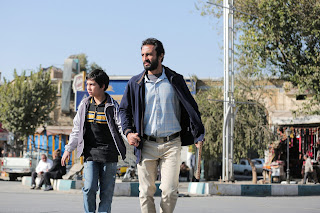Iranian director Asghar Farhadi embraces moral ambiguity. His characters almost always are complex creations, which means that his is a cinema built on unreliable first impressions.
In A Hero, Farhadi shows us that a web of lies can ensnare just about everyone it touches. And as is often the case, Farhadi uses a specific story as a lever from which to launch a many-faceted look at Iranian society.
The movie begins when Rahim (Amir Jadidi), a divorced prisoner, visits a historical site where his brother-in-law (Alireza Jahandideh) plies his trade as a construction worker. On a two-day pass from confinement, Rahim hopes to find a way to repay the debt that sent him to prison in the first place.
Rahim, we soon learn, owes money to an unforgiving creditor (Mohsen Tanabandeh) who believes that Rahim is a fraud and who also happens have been a relative from his former marriage.
A specialist in bad luck, Rahim is also a victim: He borrowed money to start a business but his partner absconded with the funds
Rahim's goals are simple: He wants to reestablish a relationship with his young son (Saleh Karimai) and marry his new sweetheart (Sahar Goldust).
Worthy aims, but nothing in Rahim's life can proceed until he pays off his debt. He's trapped by circumstance, and Jadidi makes us feel the squeeze that tightens around a man with few resources at his disposal.
I guess you could say that Rahim wants to claw his way back into the middle class.
The movie hinges on a whopping contrivance. Early on, Goldust's character finds a handbag containing 17 gold coins. Could this be the change of luck that enables Rahim to pay his debt and resume a normal life?
Unable to sell the coins for enough money to clear his debt, Rahim decides that he might as well submit to the dictates of conscience. He begins posting fliers announcing that he has found a handbag and wants to return it its owner.
A grateful woman shows up, claims her property, and vanishes.
Much of the rest of the movie involves the various ways in which others perceive Rahim's “honesty.”
Hearing of Rahim's "heroism," the prison authorities try to capitalize on the story of an honest prisoner. When a TV crew interviews Rahim, a nonentity becomes a role model.
Rahim exemplifies the success of the prison system -- and he begins to enjoy his new status, which is also celebrated on social media, not a good sign because we all know that what social media gives, it also quickly can take away.
Eventually, a bureaucrat begins to investigate Rahim's story and we sense that nothing good will come of the fuss when Rahim creates a ruse of his own.
Farhadi (A Separation) piles on the complexities -- perhaps to the point where his characters are slightly obscured and the movie begins to feel too issue-oriented, an attempt to find the point where the personal and social conflate and collide.
Still, A Hero shouldn’t be discounted. In a contest that could be viewed as a measure to see who (if anyone) will emerge as a good guy, it should surprise no one that Farhadi finds no real winners.

No comments:
Post a Comment